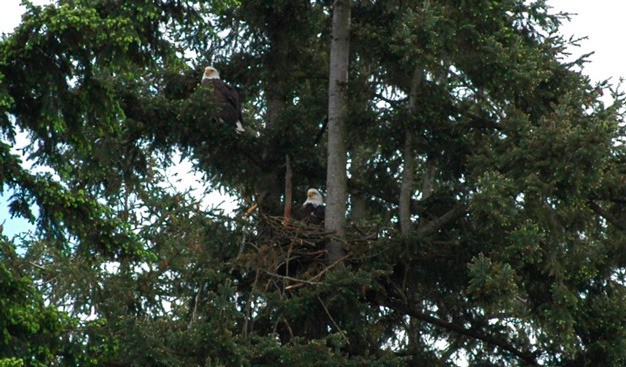A dead bald eagle found this month in Kent likely died from a territorial dispute with another eagle.
A Kent woman found the eagle March 8 near Panther Lake, not far from where two eagles had created a nest. The woman had a relative take the eagle to the U.S. Fish and Wildlife Law Enforcement office in Redmond, according to an email from Doug Zimmer, spokesman for the state Department of Fish and Wildlife.
“Examination revealed that the bird likely died from injuries received in a territorial dispute with another eagle,” Zimmer said in the email. “Territorial disputes are usually not fatal but it does happen.”
The woman who found the eagle said she didn’t want to talk about the incident to avoid drawing attention to the nest location.
Zimmer elaborated about eagle fights during a phone interview.
“They fight in the air and most of the time it results in driving off the other bird,” he said. “Sometimes, there is a double fatality. Twice in my 30 years (of work) both have crashed to the ground.”
Zimmer said that the eagle’s death did not have any connection to reports of a property owner possibly cutting trees near the nest on Kent’s East Hill.
“The nest is in a relatively urban area with houses around it,” Zimmer said. “Several years ago we had a case with tree cutting by a landowner near the nest.”
That case resulted in state wildlife officials telling the property owner what could legally be done near eagle nests. The landowner agreed to voluntarily replant trees that had been cut.
The incident last month had to do with branches knocked down by the January storms as state wildlife officials again contacted the property owner after complaint calls.
“We made sure everyone understands the guidelines around an eagle nest,” Zimmer said. “There was no violation. Everyone was reminded to be responsible.”
Eagles are protected by federal law under the Bald and Golden Eagle Protection Act enacted in 1940 and amended several times since then, that prohibits anyone, without a permit issued by the Secretary of the Interior, from taking bald eagles, including their parts, nests, or eggs. The act provides criminal penalties for persons who “take, possess, sell, purchase, barter, offer to sell, purchase or barter, transport, export or import, at any time or any manner, any bald eagle … [or any golden eagle], alive or dead, or any part, nest, or egg thereof.” The act defines “take” as “pursue, shoot, shoot at, poison, wound, kill, capture, trap, collect, molest or disturb.”
For purposes of these guidelines, “disturb” means: “to agitate or bother a bald or golden eagle to a degree that causes, or is likely to cause, based on the best scientific information available, 1) injury to an eagle, 2) a decrease in its productivity, by substantially interfering with normal breeding, feeding, or sheltering behavior, or 3) nest abandonment, by substantially interfering with normal breeding, feeding, or sheltering behavior.”
In addition to immediate impacts, this definition also covers impacts that result from human-induced alterations initiated around a previously used nest site during a time when eagles are not present, if, upon the eagle’s return, such alterations agitate or bother an eagle to a degree that interferes with or interrupts normal breeding, feeding, or sheltering habits, and causes injury, death or nest abandonment.
The penalty for violating the eagle protection act can result in a fine of $100,000, imprisonment for one year, or both, for a first offense. Penalties increase substantially for additional offenses, and a second violation of the act is a felony.
Eagles return to the same nest or build a nest close to an old nest. The nest-building season runs from about March through April.
“That’s why we protect the nest,” Zimmer said. “Eagles are faithful to the site.”
Andrea Jeded, a city of Kent wetland ecologist, said only a few active eagle nests exist in the city. She said other nests are near Lake Fenwick and the city’s operations Public Works Operations office along Russell Road near the Green River. She said a nest out near Lake Meridian is no longer active.
“One eagle is still around,” Jeded said about the Panther Lake nest.
Zimmer said eagles do not mate for life. After nesting, they split up and come back the next year to the nest. If the same partner shows up, they stay together. If not, they find a new partner.
There are approximately 840 nesting pairs of bald eagles in Washington, Zimmer said. But there are also eagles that do not nest, so the overall population is more than 1,600 and fluctuates day to day and year to year.
The remains of dead eagles are sent to the National Eagle Repository in Denver, Colo., Zimmer said. The U.S. Fish and Wildlife Service established the repository in the 1970s to provide Native Americans with feathers to be used in ceremonies.
For guidelines on what activities may disturb an eagle next, go to www.fws.gov/pacific/eagle/guidelines/disturbnestingbaea1.html.
Talk to us
Please share your story tips by emailing editor@kentreporter.com.
To share your opinion for publication, submit a letter through our website https://www.kentreporter.com/submit-letter/. Include your name, address and daytime phone number. (We’ll only publish your name and hometown.) Please keep letters to 300 words or less.

